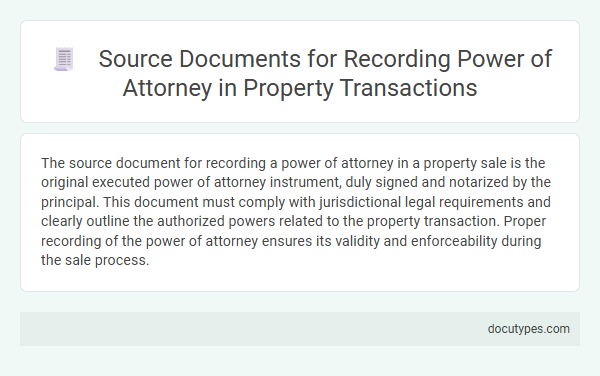The source document for recording a power of attorney in a property sale is the original executed power of attorney instrument, duly signed and notarized by the principal. This document must comply with jurisdictional legal requirements and clearly outline the authorized powers related to the property transaction. Proper recording of the power of attorney ensures its validity and enforceability during the sale process.
Introduction to Source Documents in Property Transactions
In property transactions, source documents serve as the foundational records that verify ownership, authority, and legal rights. These documents are essential for ensuring the legitimacy and smooth execution of a property sale.
One critical source document in this process is the power of attorney, which authorizes someone to act on behalf of the property owner. Your power of attorney must be properly recorded to validate the agent's authority in the sale.
Understanding Power of Attorney in Real Estate
A power of attorney (POA) in real estate authorizes an individual to act on behalf of another during property transactions. The source document for recording this authority is critical for legal validation in property sales.
- Power of Attorney Document - This original or notarized document grants the agent legal authority to act for the property owner.
- Notarization - The POA must be notarized to verify the authenticity of signatures and prevent fraud.
- Recording Office Submission - The POA document is submitted to the county recorder or land records office where the property is located for official recording.
Key Legal Requirements for Power of Attorney Documents
The source document for recording a Power of Attorney in a property sale is the notarized Power of Attorney deed. This document authorizes an agent to act on Your behalf in real estate transactions.
- Notarization Required - The Power of Attorney must be notarized to validate the authenticity of the signatures.
- Clear Property Details - The document must explicitly specify the property involved to avoid ambiguity.
- Signature of Principal - The principal's signature is mandatory to legitimize the authorization process.
Proper submission of the original notarized Power of Attorney at the land registry ensures legal recognition of the agent's authority in the property sale.
Essential Source Documents for Power of Attorney Recording
The essential source document for recording a Power of Attorney in a property sale is the original Power of Attorney (PoA) deed, duly notarized and executed according to the jurisdiction's legal requirements. This document must clearly outline the authority granted to the agent to act on behalf of the principal in the property transaction. Ensuring Your PoA is properly recorded with the local land registry or relevant government office validates its use in the property sale process.
Identification Documents Needed for Verification
The source document for recording a Power of Attorney in a property sale is the original notarized Power of Attorney deed. Verification requires specific identification documents to authenticate the parties involved.
- Government-issued ID - Your valid passport, driver's license, or national ID card must be presented for identity confirmation.
- Proof of Address - Utility bills or official correspondence showing the current residential address are necessary for verification.
- Signature Proof - Specimen signatures or biometric verification may be required to ensure authenticity of the grantor and attorney-in-fact.
Proof of Property Ownership and Title Deeds
The source document for recording a Power of Attorney in a property sale is the title deed, which serves as proof of property ownership. This document confirms the legal owner's rights and is essential for authorizing an agent to act on their behalf. Ensuring the title deed is accurately recorded protects the transaction's legitimacy and prevents future disputes.
Witness and Notarization Requirements
The source document for recording a Power of Attorney (POA) in a property sale is the original, notarized POA document. This document must clearly specify the authority granted to act on behalf of the property owner.
Witness requirements often mandate at least two impartial witnesses to sign the POA, verifying the authenticity of the grantor's consent. Notarization is essential to ensure the document's legality and acceptance by property registries during the sale process, protecting Your transaction from future disputes.
Common Errors in Source Documents and How to Avoid Them
| Aspect | Details |
|---|---|
| Source Document for Power of Attorney in Property Sale | The primary source document is the notarized Power of Attorney (PoA) deed specific to the property transaction, often registered at the Sub-Registrar Office (SRO). |
| Common Errors in Source Documents |
|
| How to Avoid Errors |
|
Document Authentication and Registration Procedures
The source document for recording a Power of Attorney in a property sale is the notarized Power of Attorney deed. This document must be authenticated by a certified notary to ensure its legality and validity.
Document authentication involves verifying the identities of the parties involved and confirming the notarization process complies with local laws. After authentication, the deed must be submitted to the relevant land registration office for official recording. This registration makes your Power of Attorney legally effective for property transactions.
What Is the Source Document for Recording Power of Attorney in Property Sale? Infographic

